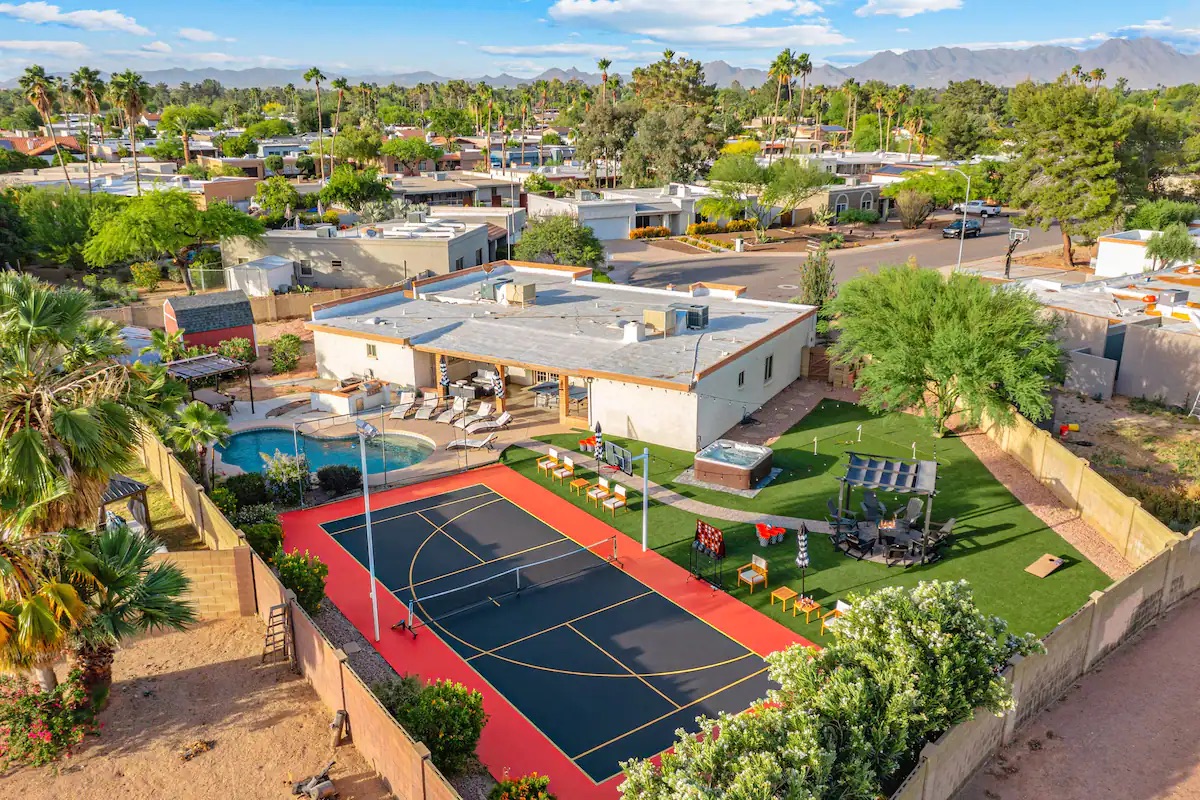Take Skift
Short-term rental companies are increasingly relying on amenities like pools, hot tubs and mini golf to differentiate their properties from the competition. Some say the end result is an “amenity arms race.”
James Farrell
Some argue that a new form of “keeping up with the neighbors” is changing the short-term rental business.
As more hosts offer more listings, the pressure to stand out from the crowd and attract guests is greater than ever. And for many hosts and property owners, the answer is to invest in more amenities, says Mark Lumpkin, owner of STR Cribs, a company that outfits short-term rentals with high-quality furnishings.
“It used to be that you could grab a three-bedroom, two-bathroom house, throw in an air mattress and a hot plate, list it on Airbnb and make a ton of money,” Lumpkin told Skift. Today, guests “want the accommodation to be part of their experience, not just a place to rest their head.”
The result is, in Lumpkin’s words, an “amenity arms race” – an increasingly fierce battle for guests that has led to more and more properties boasting a wealth of amenities ranging from simple full-length mirrors in the bedrooms to luxurious hot tubs and golf simulators.
New expectations of travelers
The post-pandemic travel boom has changed travelers’ expectations of accommodations, says David Krauss, co-founder and CEO of Rent Responsibly, an advocacy group for short-term accommodation providers. Krauss calls it a “revenge travel” generation, with locked-down travelers seeking stunning, braggadocious vacations in “travel hunger trap” locations tailor-made for social media.
“It’s no longer an industry where, ‘If you list it, they will come,'” Krauss told Skift. “You have to create an experience.”
The Amenity Premium
Hosts are under new pressure to understand their target audience, what amenities they expect and what amenities will exceed their expectations, says Krauss.
“That’s the level of maturity we think hosts need to reach,” Krauss said. “If you don’t have an interest in investing in your property, or if the economics just aren’t right, you actually get some exodus because people don’t want to keep up with the times and don’t want to keep up with their neighbors.”
Hosts and owners willing to invest in developing properties with high-quality amenities are likely to benefit. A March analysis by AirDNA found that properties with pools and hot tubs had higher revenue and occupancy rates than properties without these amenities. Luxury and upscale properties with these amenities saw more significant revenue advantages than budget or economy properties, suggesting that guests in the upscale market expect and are willing to pay for premium accommodations.
In a data case study provided by Lumpkin and compiled by the group STR Search, two well-appointed five-bedroom properties in Bradenton, Florida, with pickleball, mini golf and other resort-style amenities each generated more than $170,000 in sales last year, versus the market average of $117,616. Two other listings for five-bedroom properties in that market that offered fewer amenities both generated less sales than the average — around $100,000.
The wow factor
The push for more amenities may be driven in part by the type of guests hosts want to appeal to. According to Rent Responsibly’s recent survey of short-term rental hosts, families and “wellness or adventure travelers” were cited as the two biggest audiences hosts are targeting. And both groups tend to expect high-quality amenities — families look for on-site activities and themes for kids, and wellness travelers look for fitness options, meditation spaces or accommodations with a social media wow factor, Krauss noted.
All of this could make it harder for smaller players to compete if they don’t find a niche and don’t know what appeals to that niche, Lumpkin and Krauss say.
But Caitlin Johnston and Stefanie Medd, co-founders of Host & Stay, a company that helps hosts optimize their short-term rental offerings, point out that amenities are only part of the equation.
“Ultimately, the quality of the stay and the host’s genuine concern for the well-being of their guests are often more important than the trendiest amenities,” they said in a joint email statement to Skift.
First, build a solid business
Johnston and Medd said they’ve noticed that the hosts they work with are increasingly investing in amenities. But they said that investment usually comes after a host has already built a solid business and has capital to reinvest in the property. And while amenities can help listings stand out on platforms like Airbnb and Vrbo, they’re most effective when combined with other strategies.
“They work best when combined with other key elements such as the guest experience, high-quality visuals (including high-resolution and relevant images), effective communication with guests, positive reviews and competitive pricing,” they said.
However, they noted that in highly saturated markets where there is intense competition for guests, it is more important to keep up with the latest trends in amenities.
Take Orlando, where family-oriented short-term rentals are a dime a dozen due to its proximity to Disney World. Hosts that fail to keep up with the “amenity arms race” could face an uphill battle there, Lumpkin argued. Lumpkin says it creates a need for “aligned amenities” — things you need at a minimum to be competitive in a given market — and “outstanding amenities” — things you need to win.
“If you want to open a home in Orlando, you have to check off a Disney theme or a really cool, unique theme as an amenity, because that’s what everyone else has,” Lumpkin said. “But your standout amenity might be, ‘We have really cool custom bunk beds with slides and arcade games that the other homes in this market don’t have.'”

